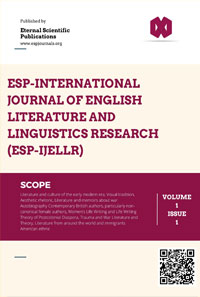ESP International Journal of English Literature and Linguistics Research (ESP-IJELLR)
Citation :
Alexander, Christopher, 2025. "Psycholinguistic Study of Code-Switching among Bilingual Speakers in Multilingual Communities" ESP-International Journal of English Literature and Linguistics Research (ESP- IJELLR) Volume 3, Issue 3: 17-27.
Abstract :
Code-switching, a multifaceted line of study and observation in bilingual communication, is defined as the use of two or more languages alternately within a discourse. And it demonstrates bilingual speakers’ cognitive flexibility and social knowledge alongside their linguistic ability. Drawing on cognitive and sociolinguistic approaches, the present paper examines the psycholinguistic mechanism of code-switching in bilingual speakers living in a multilingual society. The paper explores how lexical access, inhibitory control and social context interact in modulating code-switching behavior taking into account data from spontaneous conversational corpora and controlled experimental paradigms. Twenty early bilinguals in urban multilingual environment were selected for the study. In comparison to experimental picture naming and lexical decision tasks addressing error rates and reaction times in switch versus non-switch trials, the corpus included 100 hours of spontaneous speech that was analysed with respect to the frequency of switching as well as grammatical category and discourse function. Executive function and its modulation of linguistic interference were also examined through Simon and Stroop tasks assessing cognitive control. The findings indicate that switching has measurable reaction-time costs (average increase ≈180 ms), with especially strong costs for the less dominant to the more dominant language, and that switch costs are smaller in individuals with stronger inhibitory control. Most within-sentence shifts, especially those of nouns and discourse markers, are lexically motivated and cluster at grammar boundaries as verified by corpus analysis. These effects suggest that top-down control mechanisms determining language use contextually and linguistic specific lexical co-activation across languages dynamically mesh in the production of code-switching.In sum, the study provides support for a hybrid cognitive – sociolinguistic model of code-switching which characterizes it as both a functional strategy to facilitate communication in multilingual settings and an index of proficiency in bilingual language control. The results contribute to our understanding of how bilinguals efficiently navigate multiple language systems and adjust their language use according to cognitive and social challenges. Implications for education policy, instruction in multilingual society, and theories of bilingual language processing are discussed.
References :
[1] Abutalebi, J., & Green, D. W. (2016). Neuroimaging of language control in bilinguals: Neural adaptation and reserve. Bilingualism: Language and Cognition, 19(4), 689–698.K
[2] Auer, P. (1998). Code-switching in conversation: Language, interaction and identity. Routledge.
[3] Baayen, R. H., Davidson, D. J., & Bates, D. M. (2008). Mixed-effects modeling with crossed random effects for subjects and items. Journal of Memory and Language, 59(4), 390–412.
[4] Bullock, B. E., & Toribio, A. J. (2009). The Cambridge handbook of linguistic code-switching. Cambridge University Press.
[5] Costa, A., & Santesteban, M. (2004). Lexical access in bilingual speech production: Evidence from language switching in highly proficient bilinguals and L2 learners. Journal of Memory and Language, 50(4), 491–511.
[6] Costa, A., Caramazza, A., & Sebastián-Gallés, N. (2000). The cognate facilitation effect: Implications for models of lexical access. Journal of Experimental Psychology: Learning, Memory, and Cognition, 26(5), 1283–1296.
[7] Declerck, M., & Philipp, A. (2015). A review of control processes and their locus in language switching. Psychonomic Bulletin & Review, 22(6), 1630–1645.
[8] Dijkstra, T., & van Heuven, W. J. B. (2002). The architecture of the bilingual word recognition system: From identification to decision. Bilingualism: Language and Cognition, 5(3), 175–197.
[9] Gálvez, A., & Costa, A. (2019). The temporal dynamics of lexical selection in bilinguals: Evidence from picture naming. Cognition, 188, 72–82.
[10] Gardner-Chloros, P. (2009). Code-switching. Cambridge University Press.
[11] Green, D. W. (1998). Mental control of the bilingual lexico-semantic system. Bilingualism: Language and Cognition, 1(2), 67–81.
[12] Gullberg, M., Indefrey, P., & Muysken, P. (2015). Experimental methods in bilingualism research. In B. E. Bullock & A. J. Toribio (Eds.), The Cambridge handbook of linguistic code-switching (pp. 283–304). Cambridge University Press.
[13] Gumperz, J. J. (1982). Discourse strategies. Cambridge University Press.
[14] Kroll, J. F., & Bialystok, E. (2013). Understanding the consequences of bilingualism for language processing and cognition. Journal of Cognitive Psychology, 25(5), 497–514.
[15] Kroll, J. F., & Stewart, E. (1994). Category interference in translation and picture naming: Evidence for asymmetric connections between bilingual memory representations. Journal of Memory and Language, 33(2), 149–174.
[16] Marian, V., Blumenfeld, H. K., & Kaushanskaya, M. (2007). The Language Experience and Proficiency Questionnaire (LEAP-Q): Assessing language profiles in bilinguals and multilinguals. Journal of Speech, Language, and Hearing Research, 50(4), 940–967.
[17] Meuter, R. F. I., & Allport, A. (1999). Bilingual language switching in naming: Asymmetrical costs of language selection. Journal of Memory and Language, 40(1), 25–40.
[18] Myers-Scotton, C. (1993). Social motivations for code-switching: Evidence from Africa. Oxford University Press.
[19] Philipp, A. M., Gade, M., & Koch, I. (2007). Inhibitory processes in language switching: Evidence from switching language-defined response sets. Journal of Experimental Psychology: Learning, Memory, and Cognition, 33(4), 883–899.
[20] Poplack, S. (1980). Sometimes I’ll start a sentence in Spanish y termino en español: Toward a typology of code-switching. Linguistics, 18(7–8), 581–618.
[21] Proverbio, A. M., Leoni, G., & Zani, A. (2004). Language switching mechanisms in simultaneous interpreters: An ERP study. Neuropsychologia, 42(12), 1636–1656.
[22] van Heuven, W. J. B., Dijkstra, T., & Grainger, J. (1998). Orthographic neighborhood effects in bilingual word recognition. Journal of Memory and Language, 39(3), 458–483.
[23] Verhoef, K., Roelofs, A., & Chwilla, D. (2009). Role of inhibition in language switching: Evidence from event-related potentials in overt picture naming. Cognition, 110(1), 84–99.
Keywords :
Multilingualism, Cognitive Processing, Speech Production, Lexical Access, Language Control, Psycholinguistics, Code-Switching, Bilingualism, Sociolinguistics.


 :10.56472/25842773/IJELLR-V3I3P103
:10.56472/25842773/IJELLR-V3I3P103